
 i_need_contribute
i_need_contribute

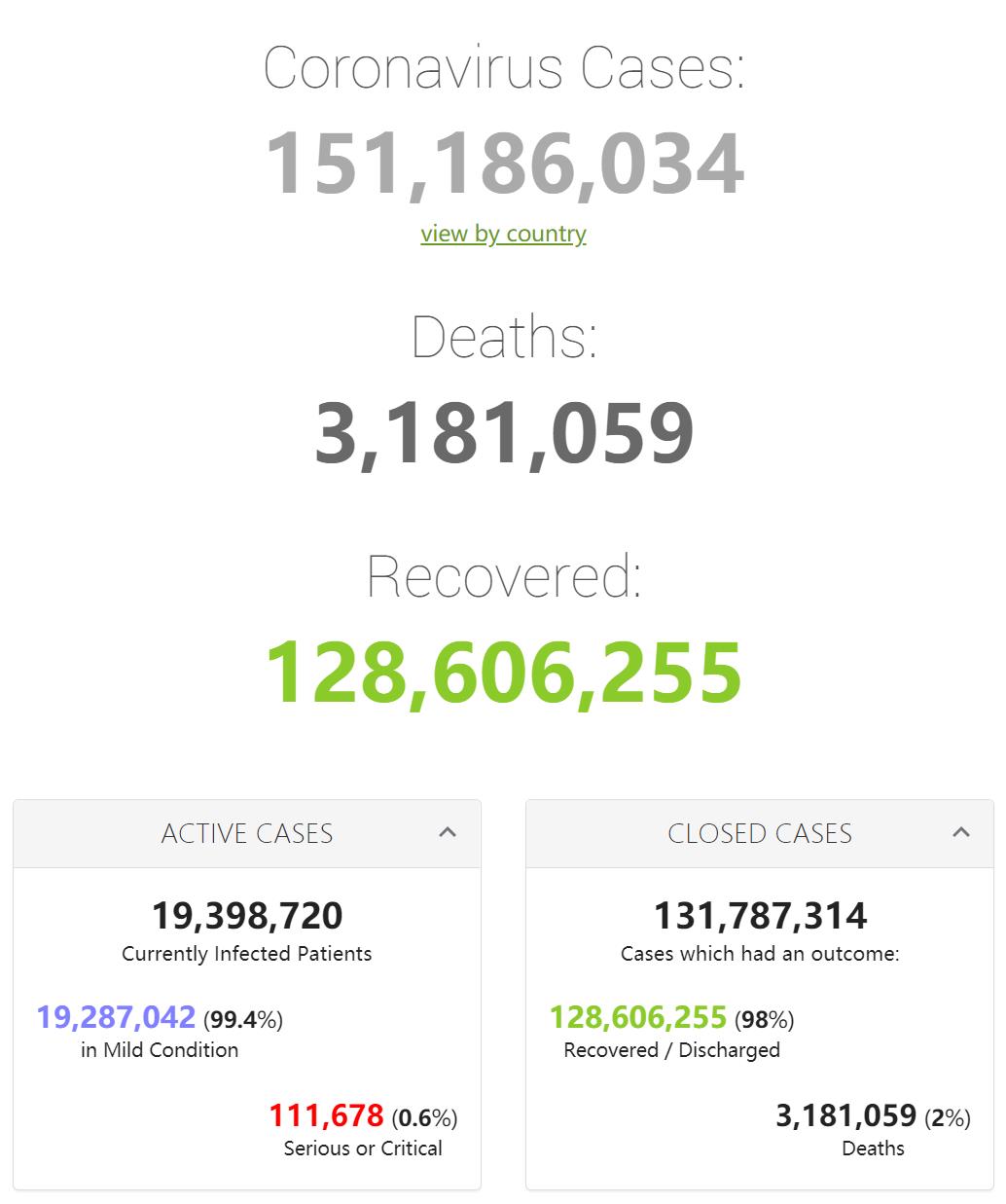
|
Country, |
Total |
New |
Total |
|
World |
151,120,342 |
+898,665 |
3,178,791 |
|
33,044,068 |
+59,269 |
589,207 |
|
|
18,754,984 |
+386,888 |
208,313 |
|
|
14,592,886 |
+69,079 |
401,417 |
|
|
5,592,390 |
+26,538 |
104,224 |
|
|
4,796,557 |
+9,284 |
109,731 |
|
|
4,788,700 |
+37,674 |
39,737 |
|
|
4,414,242 |
+2,445 |
127,502 |
|
|
4,009,208 |
+14,320 |
120,544 |
|
|
3,514,942 |
+10,143 |
78,080 |
|
|
3,379,387 |
+27,913 |
83,338 |
|
|
2,954,943 |
+26,053 |
63,508 |
|
|
2,841,934 |
+17,308 |
73,230 |
|
|
2,785,353 |
+8,427 |
67,073 |
|
|
2,479,805 |
+19,899 |
71,351 |
|
|
2,336,944 |
+3,818 |
215,918 |
|
|
2,059,465 |
+11,627 |
43,778 |
|
|
1,791,998 |
+8,659 |
61,101 |
|
|
1,662,868 |
+5,833 |
45,334 |
|
|
1,628,536 |
+2,483 |
29,213 |
|
|
1,579,536 |
+1,086 |
54,331 |
|
|
1,488,594 |
+7,271 |
17,124 |
|
|
1,211,083 |
+8,346 |
24,169 |
|
|
1,190,991 |
+6,720 |
26,247 |
|
|
1,058,794 |
+6,926 |
15,433 |
|
|
1,053,629 |
+1,850 |
27,971 |
|
|
1,028,738 |
+8,276 |
17,145 |
|
|
982,959 |
+3,925 |
24,140 |
|
|
838,407 |
+84 |
6,362 |
|
|
836,033 |
+470 |
16,974 |
|
|
815,711 |
+5,480 |
17,680 |
|
|
776,983 |
+2,584 |
27,358 |
|
|
756,955 |
+2,341 |
11,393 |
|
|
709,817 |
+1,552 |
8,801 |
|
|
687,944 |
+2,007 |
6,337 |
|
|
616,739 |
+2,229 |
10,179 |
|
|
580,988 |
+5,795 |
10,107 |
|
|
525,577 |
+1,336 |
7,249 |
|
|
518,262 |
+1,961 |
1,584 |
|
|
510,886 |
+421 |
9,020 |
|
|
416,307 |
+1,026 |
6,946 |
|
|
404,925 |
+3,332 |
1,492 |
|
|
403,728 |
+1,237 |
16,368 |
|
|
381,744 |
+564 |
11,647 |
|
|
380,689 |
+3,027 |
18,552 |
|
|
364,218 |
+323 |
6,227 |
|
|
357,233 |
+1,309 |
2,532 |
|
|
342,908 |
+2,415 |
10,315 |
|
|
330,176 |
+2,439 |
7,040 |
|
|
317,913 |
+1,392 |
4,490 |
|
|
317,530 |
+4,831 |
3,246 |
|
|
316,965 |
+2,883 |
3,638 |
|
|
308,834 |
+1,433 |
4,095 |
|
|
307,215 |
+1,902 |
10,641 |
|
|
301,831 |
+1,573 |
12,920 |
|
|
295,601 |
+1,051 |
3,231 |
|
|
276,865 |
+2,695 |
6,302 |
|
|
272,562 |
+1,417 |
1,554 |
|
|
266,214 |
+395 |
3,471 |
|
|
256,418 |
+1,130 |
3,658 |
|
|
250,554 |
+769 |
2,483 |
|
|
250,508 |
+370 |
5,795 |
|
|
248,382 |
+2,781 |
3,217 |
|
|
248,326 |
+469 |
4,899 |
|
|
245,963 |
+1,394 |
3,917 |
|
|
239,339 |
+918 |
4,243 |
|
|
226,531 |
+1,003 |
13,278 |
|
|
226,247 |
+1,626 |
7,500 |
|
|
215,528 |
+656 |
4,087 |
|
|
209,490 |
+1,134 |
5,223 |
|
|
204,976 |
+687 |
450 |
|
|
196,386 |
+1,427 |
2,117 |
|
|
195,734 |
+2,707 |
2,563 |
|
|
193,253 |
+927 |
2,010 |
|
|
177,072 |
+371 |
3,023 |
|
|
175,752 |
+1,093 |
639 |
|
|
165,055 |
+62 |
2,063 |
|
|
158,821 |
+495 |
2,707 |
|
|
152,002 |
+433 |
4,818 |
|
|
142,800 |
+10 |
3,209 |
|
|
130,977 |
+118 |
2,389 |
|
|
121,866 |
+286 |
3,244 |
|
|
121,657 |
+425 |
1,158 |
|
|
121,351 |
+678 |
1,825 |
|
|
117,795 |
+696 |
2,125 |
|
|
112,541 |
+385 |
754 |
|
|
106,484 |
+1,531 |
661 |
|
|
105,661 |
+1,149 |
632 |
|
|
97,257 |
+177 |
1,492 |
|
|
94,944 |
+345 |
1,598 |
|
|
92,562 |
+49 |
779 |
|
|
91,533 |
+49 |
1,250 |
|
|
90,642 |
+20 |
4,636 |
|
|
90,406 |
+398 |
647 |
|
|
86,613 |
+208 |
913 |
|
|
65,233 |
+668 |
308 |
|
|
63,570 |
+1,871 |
188 |
|
|
61,121 |
+35 |
30 |
|
|
10,608 |
+23 |
98 |
|
|
10,286 |
+68 |
201 |
|
|
2,910 |
+45 |
35 |
Retrieved from: https://www.worldometers.info/coronavirus/
From CNN's Jessie Yeung, Clarissa Ward and Rishabh Pratap
Flames crackle over the wails and prayers of grieving families as they mourn loved ones laid on funeral pyres that burn through the night in New Delhi.
As India's second wave of coronavirus sweeps through the country, bodies are piling up faster than workers can cremate them or build new pyres.
"Before the pandemic, we used to cremate eight to 10 people (daily)," said Jitender Singh Shunty, head of the Seemapuri crematorium in eastern New Delhi. "Now, we are cremating 100 to 120 a day."
Demand is so high that Seemapuri crematorium has expanded into its parking lot, where dozens of workers construct new cremation platforms from bricks and mortar. There is so little space and so many bodies that families have to get a ticket and wait in line for their turn.
So many fires have been lit in New Delhi that wood stocks are running low.
On Tuesday, Jai Prakash, the mayor of North Delhi, wrote a letter to Delhi Chief Minister Arvind Kejriwal, asking that the forest department provide a steady supply.
In the meantime, families are having to pay for the wood to burn their relatives' bodies. Many see no choice, as they jockey for space at crowded crematoriums.
From CNN's Gul Tuysuz in Ayvalik
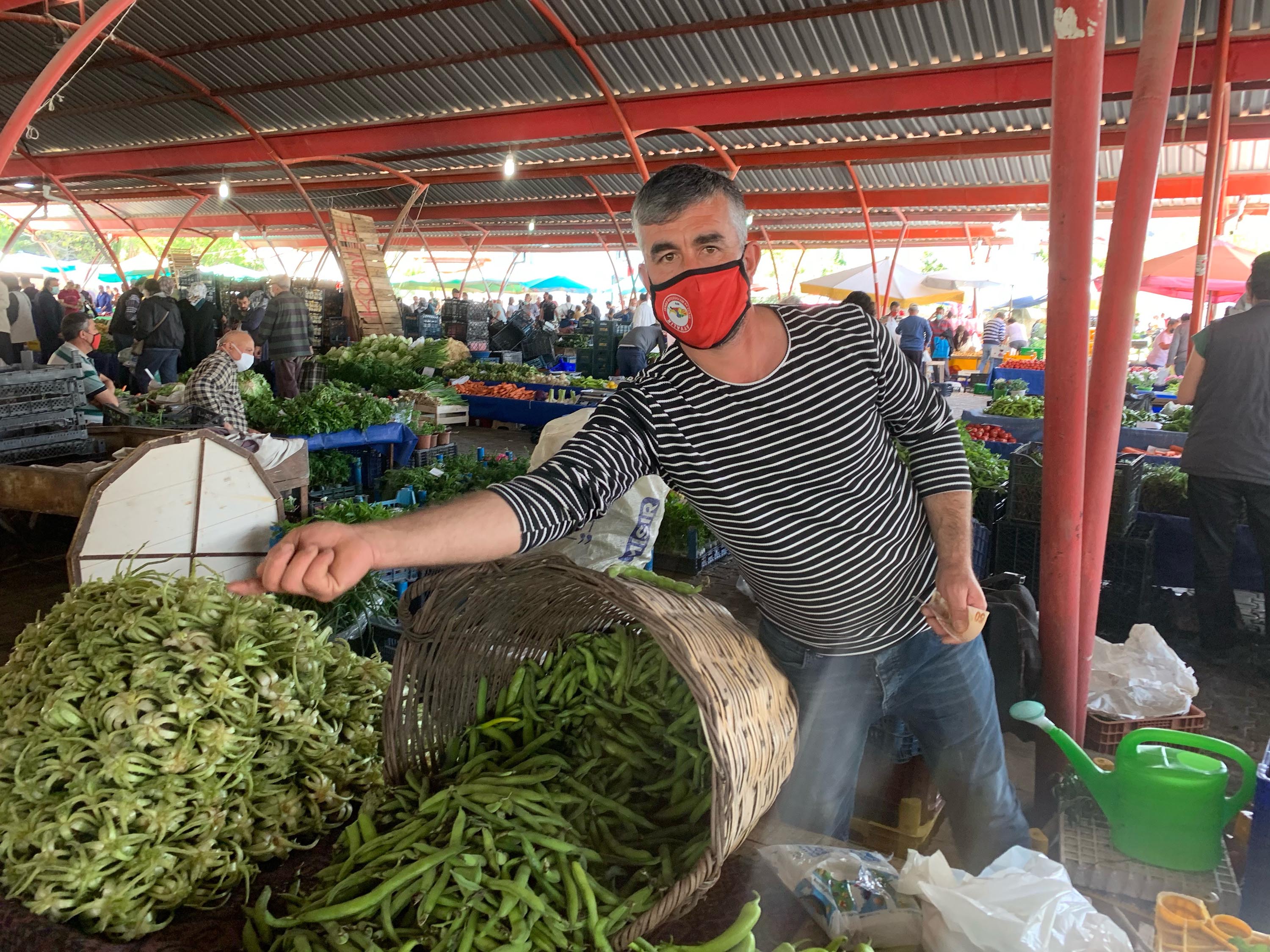
Vegetable seller Hakan Keskin, 40, is pictured at the farmers market in Ayvalik, Turkey. “This is our last chance before 3 hard weeks ahead. It’s going to be difficult our vegetables are going to get old and we won’t be making any money. It’s going to be hard days ahead for us.” Gul Tuysuz/CNN
Turkey is bracing itself for its first national coronavirus lockdown as infection rates continue to climb in the country, now the highest in Europe.
The lockdown will begin on Thursday at 7 p.m. local time and will last through the remainder of the Muslim holy month of Ramadan and over the Eid al Fitr holiday. It is scheduled to end at 5 a.m. local time on May 17, according to a statement from the Ministry of Internal Affairs.
On Thursday, streets across the country's main cities were packed with people preparing for the restrictions, with traffic accidents and queues of traffic reported across the country's main Anatolian Highway.
In the seaside town of Ayvalik on Thursday, the streets were thronged with shoppers stocking up on essentials before the three-week lockdown kicks into effect.
Hakan Keskin, a vegetable seller at the farmers' market in Ayavilik told CNN that "there are more people at the market today and they are buying more of everything." He added Thursday was the "last chance" for vendors such as himself to sell before the "3 hard weeks ahead."
"It's going to be difficult, our vegetables are going to get old and we won't be making any money," he said.
It's going to be hard days ahead for us."
Leyla Ilmen, who was shopping at the farmers' market, told CNN that there were "more people than usual" and that "everything is more expensive."
Turkey initially responded to a surge in Covid-19 infections back in early April -- when the country recorded its highest daily cases and deaths with more than 60,000 daily new cases -- by tightening some Covid-19 restrictions. But on Monday, the government took that step further by announcing the national lockdown.
On Wednesday, Turkey recorded 40.444 new Covid-19 cases and 341 deaths, according to the Turkish Health Ministry Covid-19 online dashboard.
The lockdown comes as the country faces expected delays in its vaccine rollout, according to Health Minister Fahrettin Koca.
To counter any delays in the campaign over the next two months, Koca said that the government had consequently decided to space out the two doses for the BioNTech/Pfizer vaccine.
The doses will be now be administered 6 to 8 weeks apart instead of the current interval of 28 days, the health minister said.
Koca added that there is also concern around the import of one of the variants first identified in India, known as B1.617.
"We identified 5 cases of the Indian variant in Istanbul. Those cases have been isolated and are under observation" Koca said.
Meanwhile, the highly transmissive UK variant, known as B.1.1.7, continues to be the most prevalent in Turkey, he said.
From CNN Health’s Lauren Mascarenhas
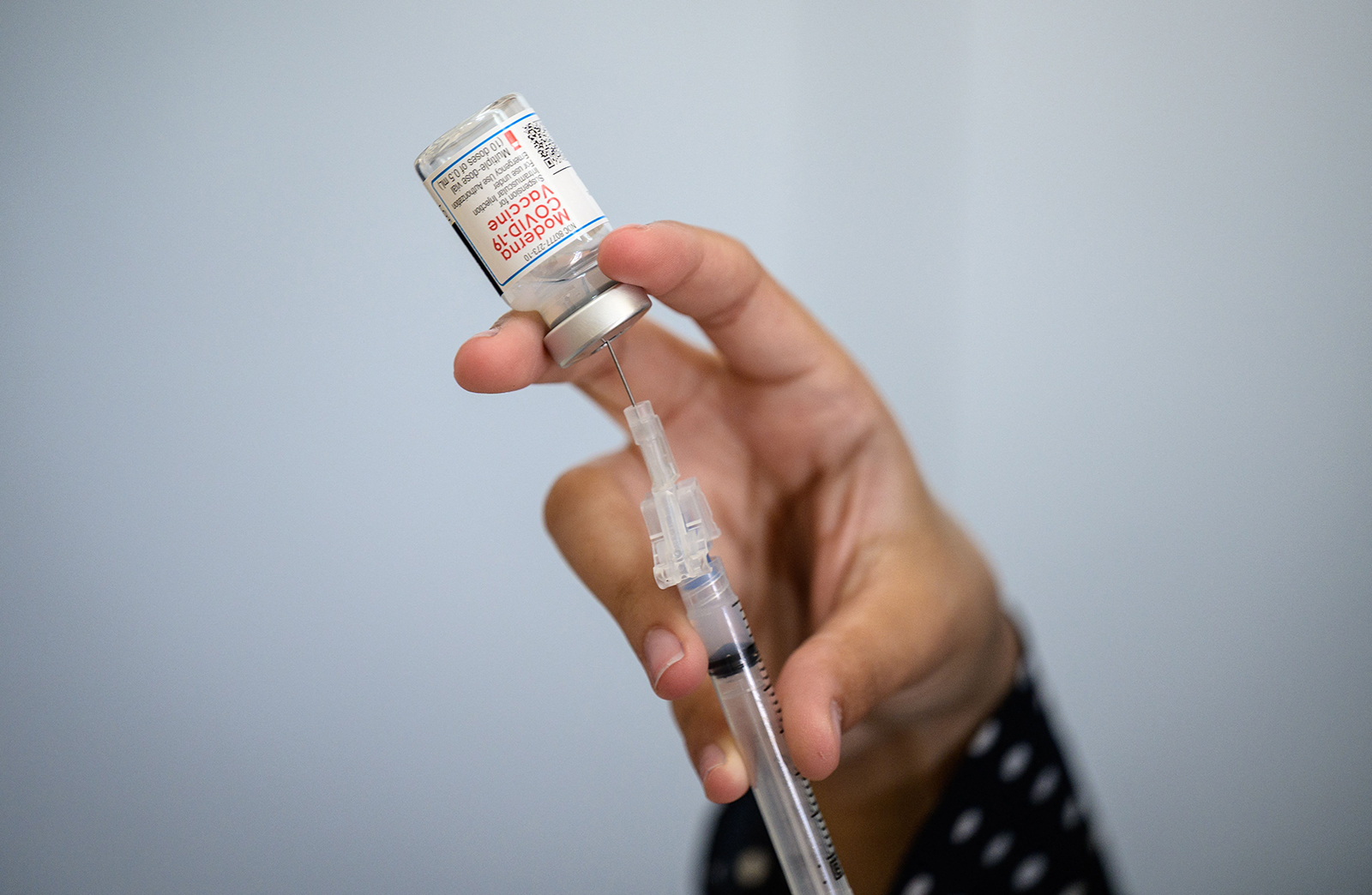
A medical staff member prepares a syringe with a vial of the Moderna Covid-19 vaccine at a pop up vaccine clinic in the Staten Island borough of New York City, on April 16. Angela Weiss/AFP/Getty Images
People will likely need a booster about 9 to 12 months after their second dose of the Moderna Covid-19 vaccine, company president Stephen Hoge said Thursday.
“I think somewhere between 9 and 12 months after your vaccination series is when people will probably need a booster vaccine -- only while the pandemic is raging,” Hoge said during an event hosted on the social media platform Clubhouse. "That’s because we need to keep people as protected as possible, while there's this really high risk of infection.”
Hoge said that he hopes the boosters will not be necessary once the coronavirus pandemic is over.
“My sense is that we all fear a winter epidemic, with respiratory viruses like influenza at the same time,” he said. “Giving a boost going into the fall is going to be the right thing. We’ve beaten back the pandemic. We need to stay ahead of it.”
Hoge noted the decision to recommend booster doses of Covid-19 vaccines will be up to public health officials, including the US Centers for Disease Control and Prevention.
“Co-administration with an influenza vaccine would be the ideal way to do it,” Hoge said. “One of the things we're going to look hard at over the summer this year, is how do we create data so that the CDC can provide that recommendation to healthcare systems so that it can be done as a single visit.”
Retrieved from: https://edition.cnn.com/world/live-news/coronavirus-pandemic-vaccine-updates-04-30-21/index.html
By Julie Turkewitz and Mitra Taj

Patients in tents outside Kennedy Hospital in Bogotá, Colombia, this month. Colombia has been able to issue a first vaccine to just 6 percent of its population.Credit...Federico Rios for The New York Times
With vaccinations mounting in some of the world’s wealthiest countries and people cautiously envisioning life after the pandemic, the crisis in Latin America — and in South America in particular — is taking an alarming turn for the worse, potentially threatening the progress made well beyond its borders.
Last week, Latin America accounted for 35 percent of all coronavirus deaths in the world, despite having just 8 percent of the global population, according to data compiled by The New York Times.
The length of the region’s epidemic makes it even harder to fight. It has already endured some of the strictest lockdowns, longest schools closures and largest economic contractions in the world.
And if Latin America fails to contain the virus — or if the world fails to step in to help it — new, more dangerous variants may emerge, said Dr. Jarbas Barbosa of the Pan-American Health Organization.
“This could cost us all that the world is doing” to fight the pandemic, he said.
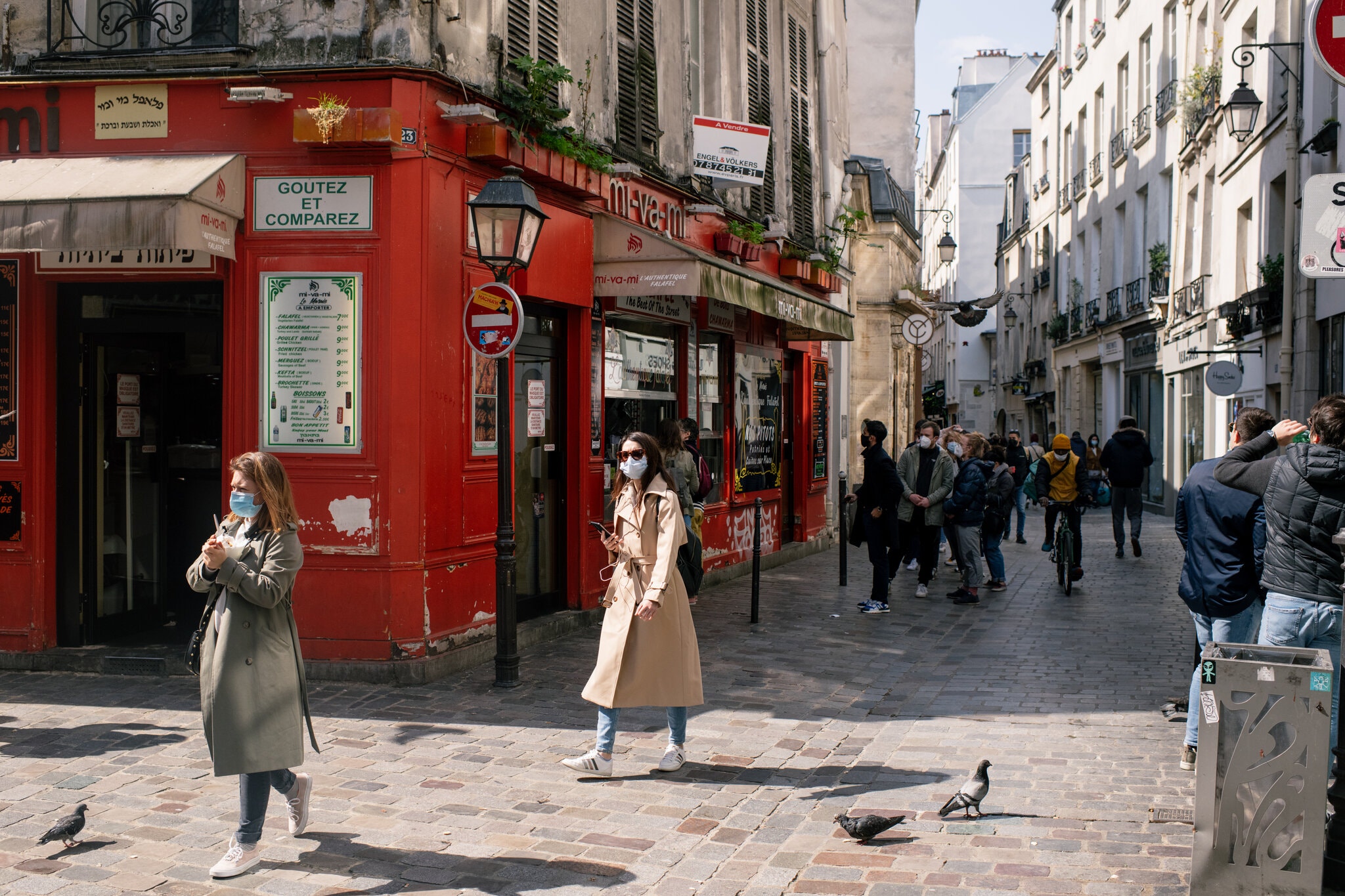
Central Paris earlier this month. President Emmanuel Macron of France began mapping the nation’s exit from a web of lockdown restrictions.Credit...Dmitry Kostyukov for The New York Times
President Emmanuel Macron of France outlined plans on Thursday for the gradual reopening of the country, plotting a path out of the labyrinth of restrictions in place and fueling hope that life might finally return to normal after waves of infections forced the country into three national lockdowns.
Mr. Macron said schools would reopen next week, followed by the return of museums, cinemas, shops and outdoor service at cafes on May 19. The 7 p.m. curfew will be pushed back to 9 p.m., he told French newspapers.
“We must recover our French art of living, while remaining prudent and responsible: our conviviality, our culture, sports,” Mr. Macron said, though he added that the reopening in some regions might be delayed if cases rise.
Cafes and restaurants will be allowed to serve patrons inside starting the second week of June, and gyms will also reopen then under certain conditions such as limited number of people. The nighttime curfew and most restrictions on gatherings will be lifted on June 30.
Mr. Macron’s announcement came as the coronavirus situation appears to be improving in France, with the average number of new daily cases falling to 27,000 from 35,000 over the past two weeks and as the vaccination campaign is finally gathering speed after months of hurdles.
The decision to gradually reopen was also a way to respond to the deep sense of fatigue and frustration that has taken root in France over an endless cycle of coronavirus restrictions enshrouding cities like Paris in deep gloom, as cafes, restaurants and cultural venues — the very heart of the capital — have been closed since the fall.
Europe has experienced a significant downturn in coronavirus cases after two months of surging infections, and other governments are rolling back restrictions. Britain, which has led the region’s vaccine rollout, has allowed pubs, bars and restaurants to reopen outdoors and is progressively lifting limits on the size of social gatherings. Switzerland adopted similar measures in mid-April and Italy started easing some rules this week.
The World Health Organization’s chief European official on Thursday cautioned, however, that infection rates across the region remained high. The official, Hans Kluge, said that public health controls and individual measures like mask-wearing would determine if cases would continue to fall. Half of all of Europe’s reported cases have occurred since January, Dr. Kluge said, as the continent has struggled against the rapid spread of B.1.1.7, the more infectious virus variant first identified in Britain.
“The virus still carries the potential to inflict devastating effects,” Dr. Kluge said. “It’s very important to realize the situation in India can happen anywhere.”
B.1.617, the variant now common in India, has been found in 10 countries in Europe, according to Ihor Perehinets, a senior official in the W.H.O. Europe emergency program. There was no evidence that Covid-19 vaccines were not effective against this variant, Oleg Benes, a W.H.O. Europe vaccine specialist, told reporters.
In other news around the world:
Retrieved from: https://www.nytimes.com/2021/04/29/world/france-covid-lockdown.html

Vaccine skeptics are much more likely than nonskeptics to have a highly developed sensitivity for liberty and to have less deference to those in positions of power.Credit...Allison Zaucha for The New York Times
For years, scientists and doctors have treated vaccine skepticism as a knowledge problem. If patients were hesitant to get vaccinated, the thinking went, they simply needed more information.
But as public health officials now work to convince Americans to get Covid-19 vaccines as quickly as possible, new social science research suggests that a set of deeply held beliefs is at the heart of many people’s resistance, complicating efforts to bring the coronavirus pandemic under control.
“The instinct from the medical community was, ‘If only we could educate them,’” said Dr. Saad Omer, director of the Yale Institute for Global Health, who studies vaccine skepticism. “It was patronizing and, as it turns out, not true.”
About a third of American adults are still resisting vaccines. Polling shows that Republicans make up a substantial part of that group. Given how deeply the country is divided by politics, it is perhaps not surprising that they have dug in, particularly with a Democrat in the White House. But political polarization is only part of the story.
In recent years, epidemiologists have teamed up with social psychologists to look more deeply into the “why” behind vaccine hesitancy. They wanted to find out whether there was anything that vaccine skeptics had in common, in order to better understand how to persuade them.
They borrowed a concept from social psychology — the idea that a small set of moral intuitions forms the foundations upon which complex moral worldviews are constructed — and applied it to their study of vaccine skepticism.
What they discovered was a clear set of psychological traits offering a new lens through which to understand skepticism — and potentially new tools for public health officials scrambling to try to persuade people to get vaccinated.
Dr. Omer and a team of scientists found that skeptics were much more likely than nonskeptics to have a highly developed sensitivity for liberty — the rights of individuals — and to have less deference to those in positions of power.
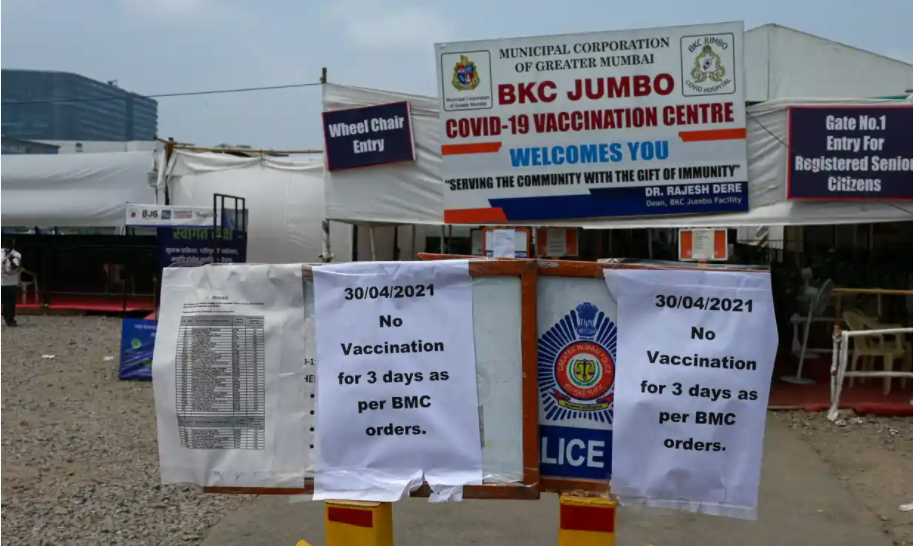
Several Indian states have run out of Covid-19 vaccines a day before a planned widening of a nationwide inoculation drive, authorities have said.
India is the world’s biggest producer of vaccines but does not have enough stockpiles to keep up with the second deadly Covid-19 wave, despite prime minister Narendra Modi’s government planning to vaccinate all adults starting 1 May. Only about 9% of India’s 1.4 billion people have received a vaccine dose since January.
Chandini Monnappa and Tanvi Mehta report for Reuters that India had originally planned to vaccinate only 300 million of its highest-risk people by August, but widened the target due to the rise in cases.
However, its two vaccine producers were already struggling to increase capacity beyond 80m doses a month due to a shortage of raw materials and a fire at the Serum Institute, which manufactures AstraZeneca’s vaccine in India.
Inoculation centres in Mumbai will be shut for three days starting Friday because of the shortage of vaccines, authorities said.
Signs announcing that there will be no vaccinations for three days due to a shortage of supplies are seen outside a Covid-19 vaccination centre in Mumbai. Photograph: Punit Paranjpe/AFP/Getty Images
In the southern state of Karnataka, home to the tech hub of Bengaluru, the state’s health minister said Karnataka’s vaccination drive for adults will not begin on 1 May.
“The state government has not received any information from companies about when they will be able to supply these vaccines,” said health minister K Sudhakar.